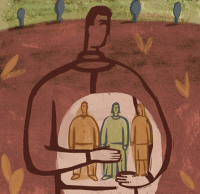In Newtown’s Wake: How Grief Is Handled at School
In the months since the horrific Newtown school shooting, a media spotlight has glared on the nearly 450 surviving students at Sandy Hook Elementary who are grieving for their friends, teachers, classmates, school staff and, in some cases, their siblings. Their stories serve as an enduring reminder of the overpowering grief and loss left in the Newtown tragedy's wake.
Sadly, for thousands of schoolchildren sitting in classrooms every day, stories of grief and loss are all too common. One in every seven Americans loses a parent or sibling before the age of 20 -- and most teachers interact with grieving students in their classrooms every year.
Most Teachers Uncertain
Experiences at school, where children spend the majority of their waking hours during the week, inevitably inform the way that grieving students process and mourn a loss. The response -- or lack thereof -- from school staff, teachers and classmates creates a critical frame of reference for a grieving child.
As David Schonfeld, MD, director of the National Center for School Crisis and Bereavement, said, "The fact is our society is uncomfortable with death and uneasy with grief, particularly when it's a child who is grieving. Grieving kids are quick to pick up on that. Afraid to burden their family with their grief, they frequently suffer in silence. The result can be a painful range of emotional, psychological and behavioral difficulties."
In a survey of educators that we conducted last year in conjunction with the American Federation of Teachers (AFT), teachers testified to grief's heavy impact. A majority of teachers we surveyed reported frequently witnessing a negative impact on academic performance and aggravated behavioral issues when a student lost a parent or guardian.
These observations are not met with indifference by educators, who were almost unanimous in their concern for the bereaved students in their midst. But all too often, feelings of uncertainty stifle the desire to help. Many classroom teachers reported sometimes feeling frustrated, insecure, guilty and hesitant in their interactions with grieving students. Almost half cited not knowing what to say or do as an obstacle they face in supporting these students.
Why such hesitancy in the face of student grief? Much of it comes down to this: the vast majority of teachers -- a staggering 93 percent -- have received no training at all on the subject of childhood bereavement. Currently, only three percent of teachers report that their school system offers any training on bereavement.
But AFT members express tremendous eagerness for training. More than nine in ten agreed that a greater focus should be placed on training educators to support grieving students.
In-Class Support
This survey should be a clarion call to administrators, school boards and parents alike; it is time to engage in a serious national assessment of the way our schools respond to and support our grieving children.
We believe that we are missing a singular opportunity, because teachers, when empowered to help, can play a decisive role in grieving students' lives. Teachers are often among the most reliably present adults while remaining distanced enough to be emotionally "safe." This gives them a tremendous ability to lend vital support. In addition to expressing care directly, they are well positioned to monitor grieving students for signs of trouble, refer them to specialized resources if necessary, and help guide classmates to respond with sensitivity and compassion.
Teachers cannot and should not be expected to take on the role of a grief counselor. But relatively simple gestures -- expressing sympathy, checking in with a parent or guardian, offering extra academic assistance -- can go a long way in helping a grieving student feel okay again at school. On the other hand, silence from a trusted teacher is confusing -- and can send a deafeningly loud message of its own.
The debate over the implications of Newtown will persist for some time. But here is one takeaway: grieving kids need our support. Schools can do more for grieving kids by offering basic bereavement training to their teachers -- and community organizations can do more to meet grieving kids' needs in the places and on the levels that schools cannot. Across the board, it's time to take better care of the grieving children among us.
My next blog post, co-authored with Dr. David Schonfeld, will present tips for how to offer this support.
